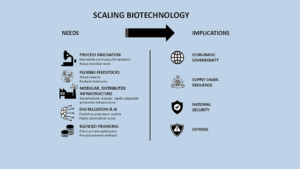
First dog snack from microbial protein
German-Portuguese biotech start-up MicroHarvest GmbH and a Munich-based pet food manufacturer want to launch the first dog snack made by single cell protein.
Single cell protein specialist MicroHarvest GmbH is set to co-develop the very first pet feed reducing the carbon dioxide pawprint of dogs in collaboration with pet meal manufacturer VEGDOG. “The protein components produced from our bacteria are extremely nutritious. They contain natural vitamins, minerals, bioavailable amino acids and are low in fat. Our studies so far have shown that they are not only healthy for dogs, but also very tasty,” commented Jonathan Roberz, co-founder and COO of MicroHarvest that last November launched a production plant in Portugal.
According to a 2020 study conducted by researchers at Technical University of Berlin, an average dog weighing 15 kilograms generates around 630 kilograms of CO₂ annually. The production of dog meals, which often are made from animal protein, has a particularly negative impact on the four-legged friend’s environmental footprint. At the Pet Food Forum Europe in Nuremberg at the beginning of May, a new type of dog snack was presented that consists of a microbial protein and has a much better environmental footprint.
MicroHarvest uses biomass fermentation and specially selected strains of microorganisms fed with agricultural side streams to produce the proteins. According to the company, the dog snack is a novelty on the European market, combining the microbial protein developed by MicroHarvest with ingredients such as potato and apple pomace. Due to its hypoallergenic characteristics, the new treat is particularly suitable for dogs with pronounced intolerances to conventional protein sources and allergies and is therefore also interesting for use in veterinary practices. With the move to pet meals, the company is circumventing the lengthy EU market authorisation for Novel Food and can generate first revenues.
According to the company, the environmental footprint of the new dog snack, at 1.4 kg CO₂ equivalent per kilogramme of product, corresponds to that of insect proteins and is therefore also significantly lower than that of dog food with vegetable proteins.”In a world where protein demand is expected to increase by 50% by 2050, we believe that microbial protein is a powerful and effective way to innovate and diversify protein offerings. We look forward to partnering with VEGDOG to bring this unique dog treat to the market,” said Jonathan Roberz.
In a study conducted by MicroHarvest and Wageningen University in the Netherlands, 73% of respondents were open to treats containing proteins from microorganisms. Furthermore, 75% were prepared to integrate this snack into their pet’s complete diet, provided it was palatable. In a subsequent palatability study, the dog snack with protein from microorganisms was chosen more frequently than those snacks made from poultry, according to the companies. “Our goal is to show dog owners that they don’t have to turn to meat-based products to feed their pets,” stressed Tessa Zaune-Figlar, founder and CEO of VEGDOG.


 SPRIND
SPRIND Rheticus/Evonik
Rheticus/Evonik adobe stock photo - JR-50
adobe stock photo - JR-50